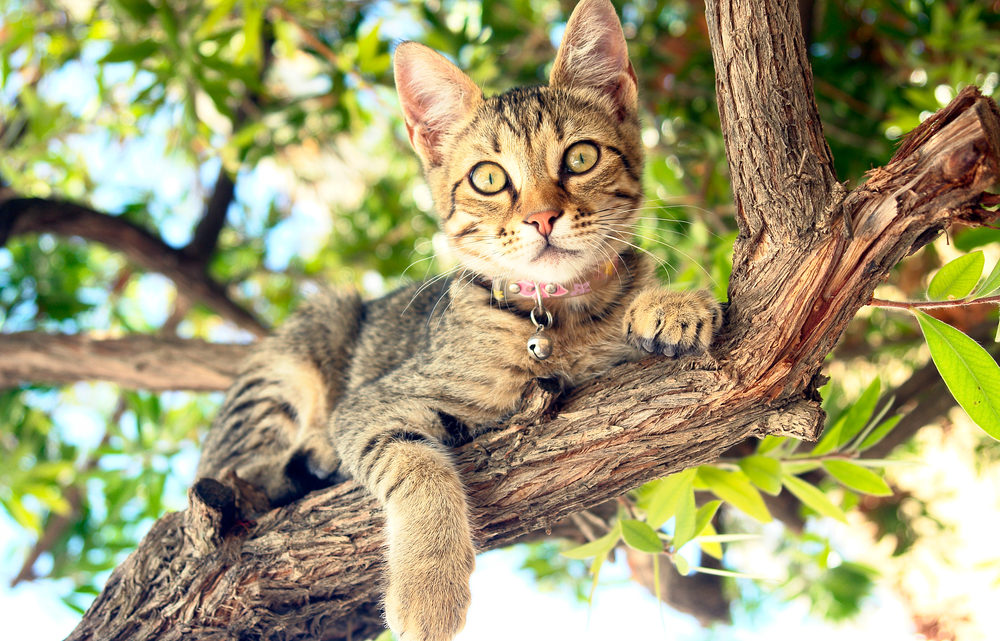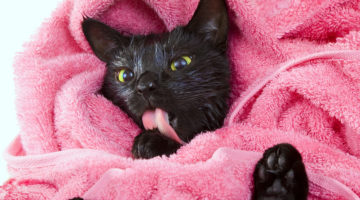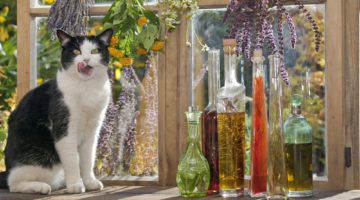From fleas to heatwaves, the summer months can be uncomfortable and even dangerous for your cat. Here’s how to keep her cool and contented.
It’s summertime, but the living may not be so easy for our cats. From heatwaves and too much sun exposure, to nasty pests like fleas and ticks, the warm weather months can be unpleasant for kitties. Let’s look at some simple ways to ensure your cat stays cool and comfy through the summer.
For cool cats
For health and safety purposes, cats should be kept indoors at all times of the year. If your cat does go outside during the summer, she’s probably pretty good at searching out cool spots on hot days. If she lives indoors, however, you need to ensure the temperature is going to comfortable for her. During a heatwave, a house without air conditioning can get very warm and stuffy. Use the air conditioning if you have it (just don’t make it too cold, especially if your cat is older); otherwise, electric fans will help keep your kitty cool by moving the air. Make sure screens are secure if you keep your windows open, and always have plenty of fresh water available for your cat.
Refresh your kitty on a hot day by stroking him down using a washcloth dampened with cool water and a little witch hazel.
Outdoor enclosures are a great way for cats to safely get some fresh air, but make sure your feline will have lots of shade when she’s inside it. Many enclosures have solid roofs, and/or can be installed near trees or a wall of the house, but be mindful that the shady patches may move away as the sun crosses the sky. Don’t put your cat in her enclosure on a hot day if there’s no access to shade inside it.
It should go without saying that cars are very dangerous hot spots in warm weather. The temperature inside a parked vehicle can rapidly climb to more than 120°F, according to the American Animal Hospital Association. Limit car trips with your cat, and if you’re traveling with her, never leave her unattended in the car, not even for “a few minutes”.
Like dogs and people, cats can suffer from heat exhaustion. Red flags include panting, a staring or anxious expression, a rapid heartbeat and/or vomiting. Lower the cat’s body temperature by gently immersing him in cool (not cold) water and call your veterinarian immediately.
Summer shedding
When the temperature rises, shedding seems to increase proportionately! Help out your cat by brushing him frequently. If all the extra fur is contributing to hairballs, adding a little good quality fish oil to his food can help move things along, and improve his coat as well.
Fleas and ticks
Fleas are the bane of summertime and are a year-round problem down south. How do you know your cat has fleas? He’ll be scratching, of course, but if you’re not sure, place him on a white towel, brush him, then look for little black specks. If the specks turn reddish, that’s flea excrement; the red color is blood from the animal host.
Treatment plans abound, but what really works is persistence. Despite their prevalence and bigtime marketing campaigns, chemicals, bombs, flea collars and spot-ons are toxic. Essential oils for flea control are considered more natural, but even they can be toxic to cats if you don’t buy very high quality oils, and use them properly. Effective weapons against fleas include keeping your cat indoors, away from contact with other felines, and using food grade diatomaceous earth or beneficial nematodes. Natural and gentle shampoos formulated specifically for cats can help soothe itchy skin and repel fleas. Regularly vacuum the house, wash your cat’s bedding, and comb through his coat for fleas.
As for ticks, the best defense is to keep your cat away from grassy or wooded areas. If he roams outside on his own, check him thoroughly for ticks when he comes back inside.
One more thing — a healthy cat, fed a high quality species-appropriate diet, will have a stronger immune system and be better able to withstand pests and other seasonal issues.
Sun protection
Cats can get skin cancer, particularly on their ear tips, and those with white fur are most at risk. Felines love the sun, of course, but limit outdoor sun exposure in the summer, especially at midday. If your cat has an enclosure, or you take her out on a harness and leash, keep her in the shade as much as possible. A natural, non-toxic sunscreen rubbed on her ears and the top of her nose can also help.
We go to great lengths to make ourselves comfortable during the hottest days of the summer. Let’s ensure we do the same for our cats!







No Comment